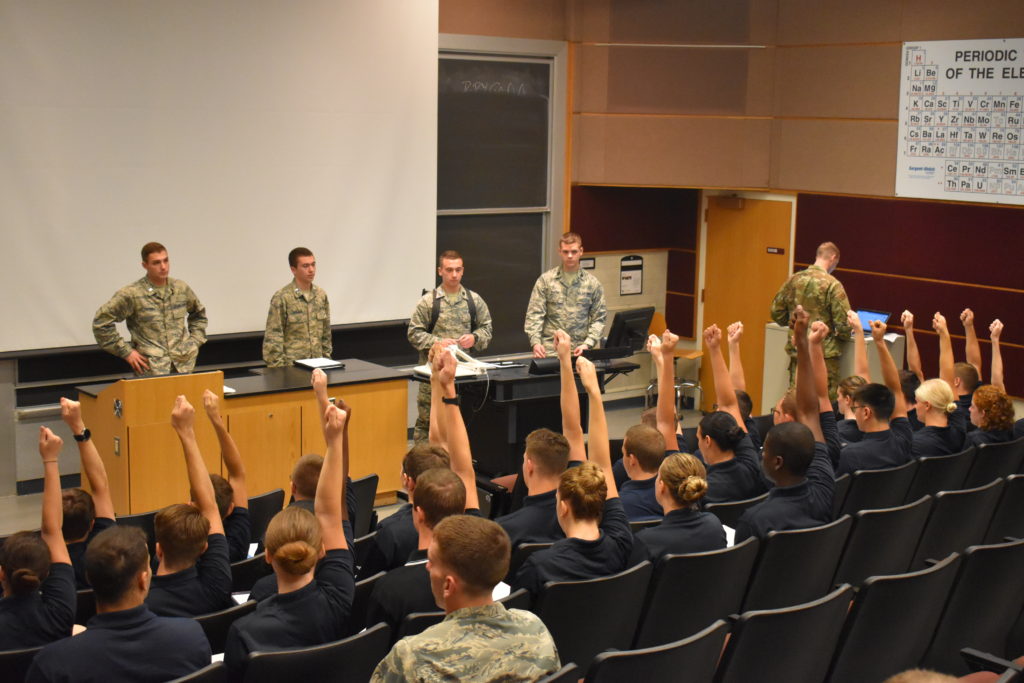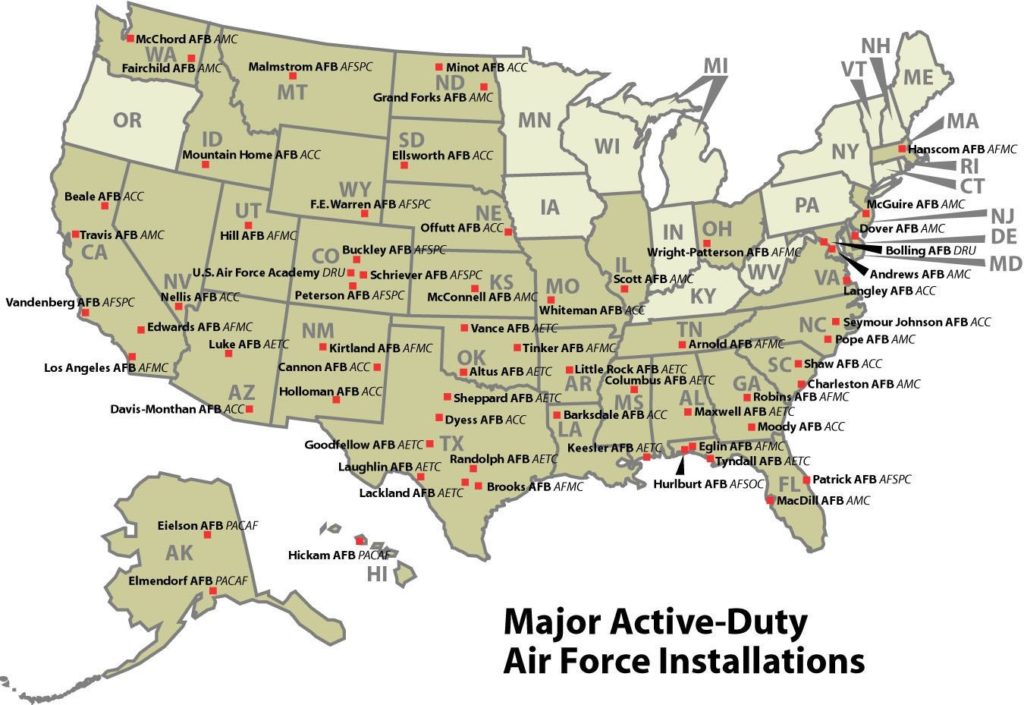
So if I’m at a crosstown, can I be a full Det 390 cadet?
Yes! Crosstown cadets are as much of a Det 390 cadet as a University of Michigan cadet.
How many days a week will I have AFROTC commitments?
Thursdays are our big training days. You will knock out the minimum requirements for the week on Thursday if you are a crosstown! University of Michigan and EMU cadets will have to attend one more PT session during the week. We understand that you are busy and have lots of classes, and we want to add to your college life, not take from it.
There are voluntary events during the week/weekends, but they are not a requirement. If you can only make training on Thursdays for a semester or two, that is okay. As you gain experience as a cadet, we hope that you want to do more!
What financial incentives are available within AFROTC?
Scholarships – We have full-ride scholarships and a Commander’s Leadership Scholarship that cover 100% of in-state tuition and fees for Michigan residents, plus an annual $900 stipend for books and a monthly tax-free payment right to your checking account of $300-$500 that you can use to cover food and other living expenses. Better yet, eligible cadets in our program are automatically put in for these scholarships—you don’t have to fill out another scholarship application. So who is eligible for these scholarships? The standard varies based on available funding, but in general you need:
A cumulative GPA over 3.0
A previous-term GPA over 2.5
Pass the Physical Fitness Assessment (PFA)
Complete the DoDMERB (Department of Defense Medical Examination Review Board)
…these requirements take one semester to complete, so if you get started in the Fall you’d generally be eligible to compete for scholarships in the Winter semester, if you decide to continue with our program. It’s worth noting that our scholarships are retroactive to the period that they’re awarded, and if you get the scholarship this Fall then the Winter semester would be paid for as well as subsequent semesters!
What if I’m out of state? Or going to a private university?
Out of state students: Our scholarships are available to you, too! The only difference is that only Commander’s Scholarships and Type-1 Scholarships will be full tuition. The other ones would let you receive $18,000 per year off your school tuition. The other benefits (annual book stipend, monthly stipends) also apply, which make this a very valuable benefit if you receive a scholarship. It might not cover 100% of your tuition, but it sure helps out a lot…
What if I never earn a scholarship, will I still get paid to be in the program?
Contract stipends – Even if you never get a scholarship with us, Juniors and Seniors in our program are automatically given $5,400-$6,000 per year just to participate in Air Force ROTC (through twelve monthly $450-$500 tax-free payments for Juniors and Seniors, respectively). This can dramatically reduce the amount of student loans you need to take out to keep going in school.
Note that the contract stipend is independent of the scholarship (i.e., students not on scholarship receive this stipend for their last two years of AFROTC), but if you have the scholarship then you already receive the stipend, so you don’t receive both.
What happens after school? Does everyone get a guaranteed job?
With Air Force ROTC, you’re guaranteed a great job in an interesting career field upon completing our program, putting you well-ahead of your peers who may very well be struggling to find traction in the workplace after school.
What does a career as an officer look like?
It varies a lot, and there are tons of available career fields to explore. With over 50 years of combined Air Force experience, our cadre will assist you with career selection as you progress through our program. Check out here for a quick review of what Air Force officer career fields are available through AFROTC. If you’re interested in being a pilot or flying, now is a great time to join the Air Force—we’re staffing lots of pilot positions, so your odds of fulfilling your dream of flying are better now than ever. If you don’t want to fly, there are tons of non-pilot jobs available, in everything from contracting and financial management to personnel/human resources to communications/cyberspace, logistics and intelligence. If you like the idea of having a lot of responsibility, being an Air Force officer is an awesome way to get there—you’ll be doing things and managing projects at age 22 and 23 that your friends in college wouldn’t even dream of.
All Air and Space Forces career fields will begin with a mid-level manager level of responsibility, then move up from there as your education and professional experience grow in your particular career field. You’ll continuously be challenged improve, sharpening your skills with more responsibility as you go up in rank from Lieutenant to Captain to Major and beyond. Stay in for a full 20 or more years and retire with a pension, or leave after as few as 4 years with some amazing experiences under your belt.
What benefits are there to serving in the military besides my monthly paycheck?
- Besides monthly pay, you’ll also receive a monthly housing stipend that is tax-free. This housing stipend varies by location (i.e., high-expense areas like New York and California have a higher monthly payout)
- In addition to that, you’ll also get a monthly
tax-free stipend of $262 to cover
food (Basic Allowance for Subsistence).
- There are additional bonuses and various
payments based on other specific circumstances such as duty location and career
field, but the above adds up to a sizeable paycheck—especially right out of
college.
- You’ll also receive free health care
while on active duty, as well as your direct dependents. There is no
copay or deductible—you just go to the doctor and everything is taken care
of. The value of this is tremendous…in the private sector, this type of health
plan basically doesn’t exist, with most employer-sponsored plans costing
anywhere from $3,000 – $6,000 per
year (or more!) for you and your family. They’ll also have doctor visit
copays, deductibles and limits on coverage…but you won’t have to worry about
that in the Air Force.
- If you’re interested in being a pilot, you
should know that the Air Force is hiring a lot
of pilots, so the odds of being an Air Force pilot aren’t as slim as you
might think. Additionally, pilots earn huge
bonuses based on their service commitment—up to $455,000 in bonuses (yes, you read that right) for fighter pilots. That can pay off a lot of student loans rather quickly.
- Active duty Air Force officers receive 30 days
of paid leave per year. That is in addition to federal holidays
(there are 10). Finding a civilian job where you can make this kind of
money with this good of a work/life balance is, to put it lightly,
extraordinarily difficult.
- You’ll have access to an unbelievable retirement plan…a matching 401k (up to 5%, called the Thrift Savings Plan or TSP) plus a pension and retention bonuses. Work in an awesome career in the Air Force for 20 years and retire at the age of 42, then receive your annual pension starting at 40% of your salary… or leave earlier if you want, and take your 401k balance with you to your new job.
- You can get a master’s degree for free (while receiving a salary!) through the Air Force via the Air Force Institute of Technology (AFIT)
- Air Force officers also get amazing education benefits. Want to go to graduate school? The Air Force’s tuition assistance program will cover 100% of your tuition and fees, up to $4,500 per year, for degrees up to and including Ph.D’s. You’ll also eventually be eligible for the Post-9/11 GI Bill, which can really help supplement the cost of going back to school while on active duty and beyond…with benefits that even transfer to your kids, if you so choose.
Where could I be stationed?
It is highly career field dependent, but a map with all of the US bases is shown below:

Could I be stationed abroad?
Around the world, there are Air Force bases everywhere from Aviano (Italy) to Ramstein (Germany), Kadena (Japan), Andersen (Guam) and plenty more—so if you’ve ever wanted to travel and live overseas, there are plenty of amazing opportunities in the Air Force to do just that. At the beginning of your senior year in ROTC, you identify (up to) the top six career fields you want to serve in, then the top locations you want to move to. From there, the Air Force will do the best it can to assign you based on where you’d like to go, subject to the limitations of the needs of the Air Force (i.e., not everyone gets to go to Hawaii for their first duty assignment). From there, you will probably move every 2 to 4 years to a new base.
What are the weight requirements?
In order to be an Air Force ROTC cadet, you must meet certain physical fitness and BMI (Body Mass Index) standards. The BMI standard is based on your height and weight—the maximum Air Force ROTC cadets is a BMI of 25, which is shown in the table:

If your weight is above the maximum, you will have your body fat measured by a waist and neck circumference calculation (for athletes or those who have more muscle mass, they will tend to weigh more than the BMI table allows while still having a low enough body fat to qualify for Air Force ROTC). For males, the maximum body fat percentage is 18% and for females, the maximum body fat percentage is 25%. You must either pass the BMI calculation from the table above or the body fat percentage calculation in order to go to Field Training, contract, or commission into the Air Force through ROTC. Note that you can join our program if you exceed these standards, but you should work quickly to get within standards in order to fully participate and complete the program (we can help you with this).
Is there any commitment when I join the program?
Definitely not! We have plenty of students try us out for a semester then drop out of the program for a variety of reasons, and we’re absolutely happy to have you join us if you just want to see what Air Force life might be like. You aren’t committed to joining the Air Force until you contract with us, which typically takes place after Field Training. However, we do contract cadets who receive and accept a scholarship, so this could be earlier if you earn a scholarship through our program. Either way, you’ll have plenty of opportunities to decide if our program or the Air Force isn’t right for you. You have nothing to lose by joining us and giving it a shot!
Cadets who complete the program and enter active duty are committed to Air Force service for four years (ten years if they opt-in to being a pilot or 6 if they decide to go in as a navigator, drone pilot, or combat system operator), after which you can leave the Air Force with a great deal of leadership experience under your belt. Alternatively, you could continue service in the Air Force and enjoy an awesome career working around the world doing incredible things with some amazing people!